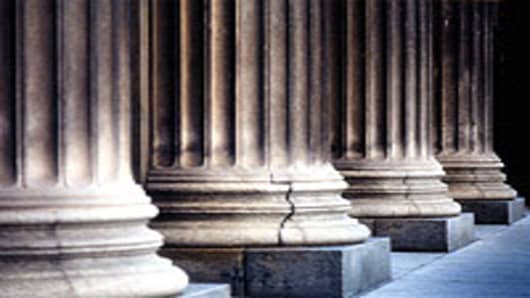Treasury Secretary Timothy Geithner should have done more to stop the financial crisis before it started, rather than try now to impose unnecessary reforms on the banking system, analyst Dick Bove said.
In a a much-discussed op-ed piece Friday for The Wall Street Journal, Geithner says a collective “amnesia” about what caused the crisis drives opposition to reform. He adds that “financial safeguards” during the crisis that exploded in 2008 “were tragically antiquated and weak.”
“Only four years after the financial crisis began to unfold, some people seem to be suffering from amnesia about how close America came to complete financial collapse under the outdated regulatory system we had before Wall Street reform,” he writes.
But Bove, who is vice president of equity research at Rochdale Securities, said the Treasury secretary’s memory may be a bit short as well.
Geithner, while at Treasury, supported the 1999 Gramm-Leach-Bliley law that helped unleash the too-big-to-fail institutions that required bailouts, and failed to flag any of the financial system excesses, particularly in the mortgage market, that drove the crisis, Bove said.
“Quite frankly, I find this article almost unbelievable in its lack of veracity in explaining the past, and even more outrageous in failing to understand what has been done to harm the future,” Bove wrote in an analysis.
When Geithner took over the New York Fed in 2003 he never protested excessive risk taking by banks, Bove said.
The crisis evolved following years of easy lending practices aimed at fostering home ownership. Excessive leverage by institutions such as Bear Stearnsand Lehman Brothers proved fatal when overnight lending operations dried up.
When the crisis exploded in 2008, Geithner worked with then-Treasury Secretary Henry Paulson and Federal Reserve Chairman Ben Bernanke to implement a variety of liquidity programs to help revive the system.
Instead of advocating bailouts, Geithner years earlier could have urged the Federal Reserve , where he was a member of the Open Markets Committee, to tighten monetary policy and curtail risk-taking, Bove said.
“There is no record that he understood the risks; disagreed with the Federal Reserve policies that fostered that risk; or took any substantive action to combat that risk,” Bove said. “Mr. Geithner was part and parcel of the problem. Apparently he has forgotten that everything in his history suggests this.”
In his opinion piece, Geithner argues that reforms, such as the Dodd-Frank regulations and the Volcker Rule that restricts banks from trading for their own benefit, will help prevent another collapse.
“The greater error would be for Congress or the regulators, under tremendous pressure from lobbyists, to once again exempt large swaths of the financial industry from rules against abuse,” he wrote.
But Bove argues that the new reformsare not helping consumers, but rather driving banks out of business.
“If the political establishment actually believes what is written here,” Bove said in reference to Geithner’s Journal piece, “this country is in more danger than one imagines.”
“More importantly, a) having a bunch of people who know virtually nothing about the financial system, b) pass laws to regulate that system in c) an environment of total hysteria fueled in part d) by political games playing can only result in disaster,” he added. “The argument that these reforms would have stopped the crisis from developing had they been in the place is a lack of understanding as to how financial systems work.”
Geithner did not immediately respond to a request for comment on Bove's critique.




